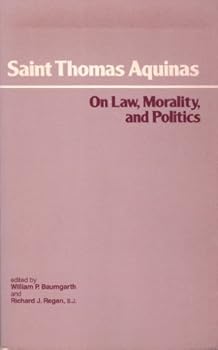On Law, Morality, and Politics
Select Format
Select Condition 
Book Overview
The second edition of Aquinas, On Law, Morality, and Politics retains the selection of texts presented in the first edition but offers them in new translations by Richard J. Regan--including that of... This description may be from another edition of this product.
Format:Paperback
Language:English
ISBN:0872200310
ISBN13:9780872200319
Release Date:January 1988
Publisher:Hackett Publishing Company
Length:288 Pages
Weight:0.91 lbs.
Customer Reviews
3 ratings
Persuasive dialectic by the angelic doctor
Published by Thriftbooks.com User , 15 years ago
In this volume, William Baumgarth and Richard Regan of Fordham University offer the reader selections from Aquinas's Summa Theologica (summary treatise on theology), which is comprised of Part I, dealing with God, creatures, and human nature; Part I-II, dealing with the human end, human acts, virtue, and law; Part II-II, dealing with specific moral virtues and human acts; and Part III, dealing with Christ's redemptive sacrifice (never completed). The portions of the Summa selected for the present volume revolve around the questions of law and morality and thus come mainly from Parts I-II and II-II of the Summa. The individual chapters of the present work treat the following topics: conscience, law, justice, property, war and killing, obedience and rebellion, tolerance and church-state relations, and practical wisdom and statecraft. Some of these questions are drawn not only from the Summa, but from Aquinas's Commentary on the Sentences of Peter Lombard as well. The following is a review of some of Aquinas's questions treated in the present volume: 1. Law (Summa I-II) A law is a promulgated ordinance of right reason for the common good that is created by the person who is charged with the care of the community. A good law has the effect of making men's behavior good. There are four kinds: (i) the eternal law; (ii) the divine law; (iii) the natural law; and (iv) the human law. The eternal law is the eternal and unchanging Will of God. Although we cannot see it, we can perceive its effects through the rational orderliness of the universe. The eternal law is reflected in the divine law, which can only be known through God's revelation in the old law of the Old Testament and in the new law of the New Testament. The divine law is necessary to "give direction to human life" (p. 21). The natural law is the participation in the divine law that man knows by virtue of his rational nature. All men have this law written on their hearts--to pursue good and to shun evil--which is the same for all people: "the natural law regarding general first principles is the same for all persons both as to the principles' rectitude and as to the knowledge of them" (p. 47). As already mentioned, the human law is created by the governor who has care over the community and is promulgated. It should not aim to prohibit all vices and promote all virtues. A human law derived from the eternal law is a just law. However, the human law should not seek to "punish or prohibit all evil deeds," for by doing so it would inevitably "thereby also take away many goods" (p. 21). 2. Justice (Summa II-II) Aquinas defines justice as "the constant and perpetual will to render to others what is due to them" (p. 105). Because it makes human acts and human beings good by correctly directing their actions, justice is a virtue. It does not inhere in the "irascible and concupiscible powers" (p. 111), but rather, in the power of the will of its subject. Furthermore, justice is the most importa
Review of Hackett's 'Aquinas on Law'
Published by Thriftbooks.com User , 15 years ago
I found this an extremely effective collection of Aquinas. To my knowledge, Aquinas' writings are very scattered, but this volume does a good job of pulling his political and ethical writings together coherently. A full reading offers the knowledge of Aquinas' political theory, and a fair acquaintance with his ethical outlook. Not contained in this volume are writings on logic or metaphysics. I have no complaints about the format of this text. It uses good footnotes, has introductions to several formats, and lays out everything in clear language (or as clear as Thomist doctrines can be, in any case).
High quality writing on these subjects
Published by Thriftbooks.com User , 22 years ago
To my knowledge only a threesome authors-philosophers (Sartre, Nietzsche and Macchiavelli) would have been able as well to tell "useful" words on this combination of topics Aquinas chose.The author - few are more original than Thomas - looks back on, examines some of the most basic, important questions that interest humanity (human nature and ethics, politics and law..) and explores them in the light of Christian faith, as well as ancient philosophy. Of the "ancients" he looks in particular close to Aristotle, whom's version the Bible was of till then. So one could say that he was sort of a predecessor for the great humanists...Aquinas tries to restore the autonomy of nature and reason, in full harmony with (Christian) faith. The result of his work is genial, both what concerns the scholastic ànd "thomistic" style as well as for the special way of exploring and investigation through which he succeeds to "restore in faith". Everyone who wants to read Aquinas should know that the author writes in a very specific, difficult way. It looks from time to time he opposes to himself, but after studying his readings one can only conclude that this is REAL top-of-the-shelf literature (for those esp. who like theology, philosophy, politics,...).





